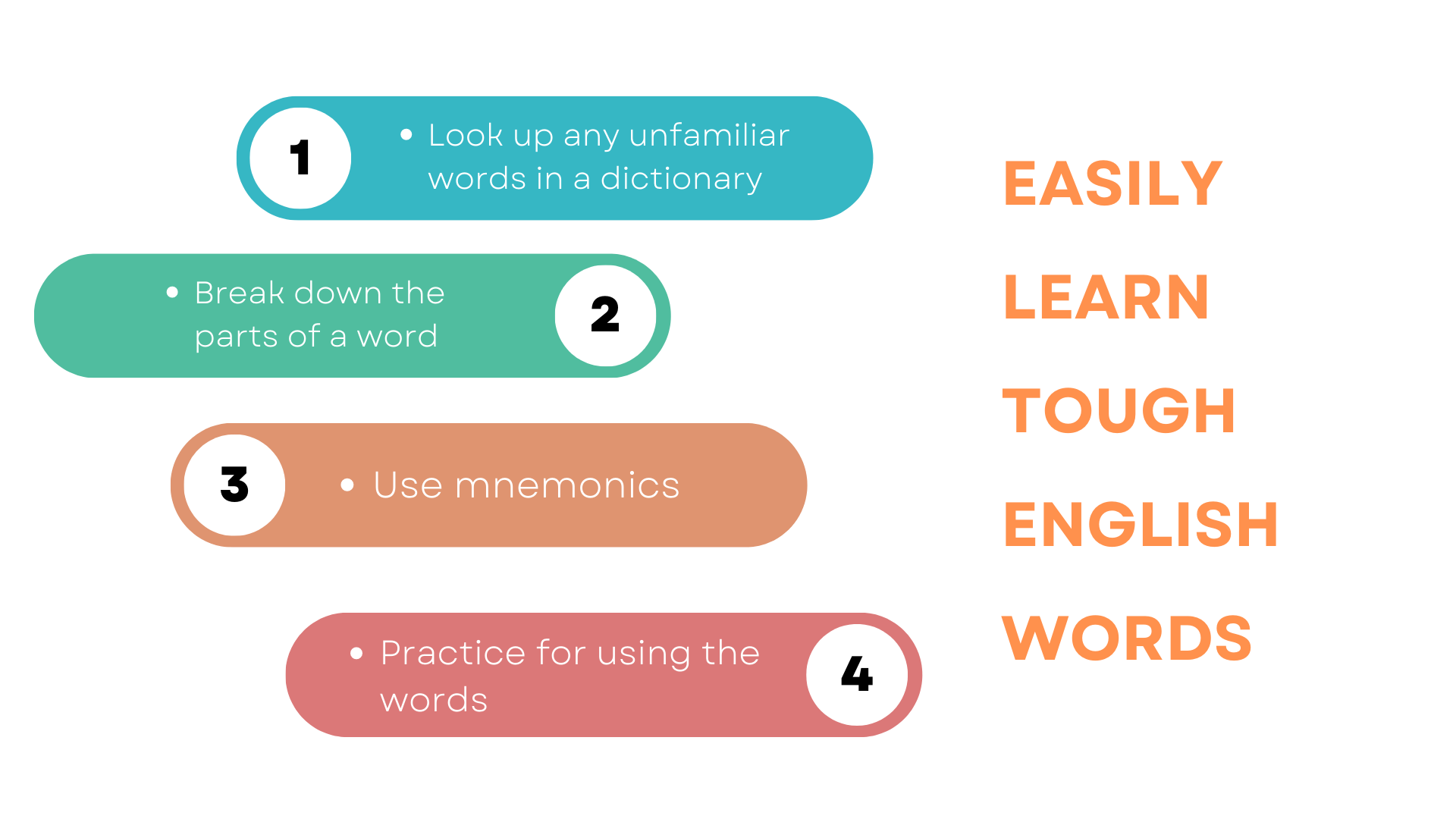Learn Tough English Words Easily
How to Learn and Remember the Tough English Words Easily

Tough words in the English language can be challenging to learn and understand. However, there are some tips and tricks that can help you avoid confusion and improve your understanding of these words.
Look up any unfamiliar words in a dictionary
First, it’s important to take time to look up any unfamiliar words in a dictionary. This will provide you with the definition and pronunciation of the word, which can help make it easier to remember. Additionally, you can use context clues to figure out the meaning of a word. By understanding the other words and sentences around it, you can often figure out what the word means. Not only will you learn the meaning of the word, but you’ll also be able to read its pronunciation and its various forms (noun, verb, etc.). You can also find out which language the word is derived from and its etymology. I find it a great way to expand my vocabulary.
Break down the parts of a word
Breaking down the parts of a word can be helpful in understanding how to properly use it. A word is made up of two parts: the root and the affix. The root is the main part of the word and can be found in other words with similar meanings. The affix is a prefix or suffix that changes the meaning of the root word. For example, the word “unacceptable” has the root word “accept” and the prefix “un-”, which changes the meaning of the word to mean “not acceptable”. Understanding the root of a word and its affixes can help you use the word correctly in a sentence.
Use mnemonics
Third, you can use mnemonics to remember difficult words. Mnemonics are devices that help people remember things more effectively. Mnemonics are a great way to easily remember words that can be tricky to remember. Here are some examples:
‘Big Eagle Can Also Underestimate Small Eagle’ is a great mnemonic to remember the spelling of ‘because’ (b-e-c-a-u-s-e).
‘Please Excuse Me Dear Aunti Sunita’ is a useful mnemonic to remember the order of operations in math (Parentheses, Exponents, Multiplication, Division, Addition, Subtraction).
‘Never Eat Spoiled Wheat’ is a helpful mnemonic to remember the directions on a compass (North, East, South, West).
Shashi Lata Tinde Pakandi Tere Tinde Kache Han is a punjabi mnemonic created by me that helped me to remember the carpal bones i.e. · Scaphoid · Lunate · Triquetrum · Pisiform · Trapezium · Trapezoid · Capitate · Hamate.
Similarly, you can create your own mnemonic device to help you remember the definition of a tough word. Mnemonics can be a great way to improve your memory and recall. They can help you learn concepts and information more quickly and easily, and can serve as a reminder of important facts and details. Mnemonics can also help you to break down complex concepts into easier pieces, making them easier to remember. Mnemonics can also provide an efficient way to organize information, making it easier to retrieve from memory. Finally, mnemonics can be used in a fun and creative way to engage learners and make learning more enjoyable.
Practice for using the words
Finally, it’s important to practice using the words. Use the words in context by writing sentences or stories incorporating them. Make flashcards with the words and practice them regularly. With a bit of practice, you’ll soon be mastering those tricky words. The more you use them in your everyday conversations, the more comfortable you will become with them. Additionally, reading is a great way to become familiar with difficult words. By reading books, articles, and other written materials, you can come across words that may be new to you.
Conclusion:
By following these tips, you can avoid confusion when it comes to difficult words in the English language. Taking the time to look up words, break down parts of words, use mnemonics, and practice using the words will help you become more comfortable with them. With enough practice, you will eventually be able to use these words confidently and accurately.
